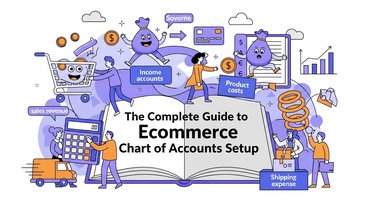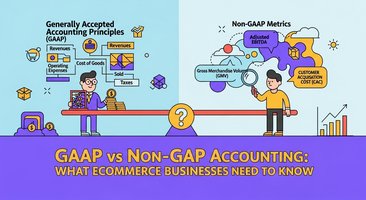Running an ecommerce business comes with unique challenges—but it also offers significant tax advantages that many online sellers overlook. Whether you're selling on Amazon, Shopify, Etsy, or running your own online store, understanding ecommerce tax deductions can save you thousands of dollars each year.The IRS allows business owners to deduct ordinary and necessary expenses related to operating their business. For ecommerce entrepreneurs, this includes everything from inventory costs to software subscriptions. The key is knowing which expenses qualify and how to properly document them.In this comprehensive guide, we'll explore the most valuable tax deductions for online businesses and show you how to maximize your tax savings while staying compliant with IRS regulations.
What Are Ecommerce Tax Deductions?
Ecommerce tax deductions are business expenses that online sellers can subtract from their taxable income, reducing the amount of tax they owe. These deductions are designed to help businesses offset the costs of generating revenue.To qualify as a deductible business expense, the cost must be:
- Ordinary: Common and accepted in your industry
- Necessary: Helpful and appropriate for your business
- Directly related: Connected to your business operations
For ecommerce businesses, this covers a wide range of expenses—from the obvious (like inventory) to the often-overlooked (like home office utilities).
Top Tax Deductions for Ecommerce Businesses
1. Cost of Goods Sold (COGS)
Cost of Goods Sold is typically the largest deduction for ecommerce businesses. COGS includes:
- Product inventory: Wholesale purchases, raw materials, manufacturing costs
- Shipping to your warehouse: Freight costs to get inventory to you
- Storage fees: Amazon FBA fees, warehouse rental, 3PL costs
- Packaging materials: Boxes, bubble wrap, labels, branded packaging
Example: If you buy products for $50,000 and sell them for $100,000, you can deduct the full $50,000 as COGS, leaving you with $50,000 in taxable income instead of $100,000.Pro tip: For dropshipping businesses, supplier fees and per-order costs are deductible even though you don't physically handle inventory.
2. Platform Fees and Software Subscriptions
Every ecommerce business relies on digital tools and platforms. These software subscriptions are fully deductible:
- Ecommerce platforms: Shopify, WooCommerce, BigCommerce, Squarespace
- Marketplace fees: Amazon seller fees, eBay listing fees, Etsy transaction fees
- Accounting software: QuickBooks, Xero, Wave, FreshBooks
- Marketing tools: Mailchimp, Klaviyo, Hootsuite, Canva Pro
- Analytics tools: Google Analytics Premium, Hotjar, SEMrush
- Inventory management: TradeGecko, Cin7, inFlow Inventory
Example: If you pay $29/month for Shopify and $50/month for QuickBooks, that's $948 annually in deductible software expenses.
3. Advertising and Marketing Expenses
Digital marketing costs are essential for ecommerce growth and fully tax-deductible:
- Paid advertising: Google Ads, Facebook Ads, Instagram Ads, TikTok Ads
- Influencer partnerships: Payments to influencers and brand ambassadors
- Content creation: Photography, videography, graphic design
- Email marketing: Campaign costs, list building, automation tools
- SEO services: Professional SEO, content writing, link building
Important: Track your return on ad spend (ROAS) to ensure your marketing investments are profitable while maximizing deductions.
4. Shipping and Fulfillment Costs
Shipping expenses are major deductions for ecommerce businesses:
- Outbound shipping: USPS, UPS, FedEx, DHL costs to customers
- Packaging supplies: Boxes, envelopes, tape, labels, branded inserts
- Fulfillment services: Third-party logistics (3PL) fees, pick-and-pack costs
- Returns processing: Costs associated with handling returns and exchanges
Pro tip: Consider offering free shipping and building costs into product prices—the shipping costs are still deductible as business expenses.
5. Home Office Deduction
If you run your ecommerce business from home, you may qualify for the home office deduction:Simplified method: Deduct $5 per square foot of home office space (up to 300 sq ft = $1,500 maximum)Actual expense method: Deduct the percentage of home expenses equal to your office space percentageQualifying expenses include:
- Rent or mortgage interest
- Property taxes
- Utilities (electricity, gas, water)
- Home insurance
- Repairs and maintenance
Requirements: The space must be used regularly and exclusively for business purposes.
6. Professional Services
Professional fees are deductible business expenses:
- Accounting and bookkeeping: CPAs, bookkeepers, tax preparation
- Legal services: Business formation, contract review, trademark registration
- Business consultants: Ecommerce coaches, marketing consultants
- Web development: Website design, development, maintenance
Example: Hiring a CPA to handle your business taxes and bookkeeping can save you more in tax optimization than their fees cost.
7. Business Equipment and Supplies
Equipment purchases offer significant tax benefits:
- Computers and electronics: Laptops, monitors, phones, tablets
- Office furniture: Desks, chairs, filing cabinets, lighting
- Camera equipment: For product photography and content creation
- Packaging equipment: Label printers, scales, tape dispensers
Section 179 deduction: You can often deduct the full cost of equipment purchases in the year you buy them (up to $1,160,000 in 2024).
8. Travel and Transportation
Business travel expenses are deductible:
- Trade shows and conferences: Registration fees, travel, lodging, meals
- Supplier visits: Costs to visit manufacturers or wholesalers
- Business meetings: Travel to meet with partners, advisors, or clients
- Vehicle expenses: Business use of your car (mileage or actual expenses)
2024 standard mileage rate: 67 cents per mile for business use
9. Internet and Phone Bills
Communication expenses are essential for ecommerce:
- Internet service: Business percentage of home internet or dedicated business line
- Phone bills: Business cell phone or business percentage of personal phone
- VoIP services: Skype, Zoom, RingCentral subscriptions
Pro tip: If you use your personal phone for business, you can deduct the business percentage of your monthly bill.
10. Education and Training
Professional development helps grow your business and is tax-deductible:
- Online courses: Ecommerce training, marketing courses, skill development
- Books and publications: Industry magazines, business books, research materials
- Webinars and workshops: Virtual training sessions and seminars
- Certifications: Google Ads certification, Facebook Blueprint, etc.
Advanced Tax Strategies for Ecommerce Businesses
Timing Your Deductions
Strategic timing can maximize your tax benefits:
- Accelerate expenses: Make necessary purchases before year-end
- Defer income: Delay shipments or invoicing until January if beneficial
- Bonus depreciation: Take advantage of 100% bonus depreciation for equipment
Inventory Management
Inventory accounting affects your taxes:
- FIFO vs. LIFO: Choose the method that minimizes taxable income
- Inventory write-offs: Deduct obsolete, damaged, or stolen inventory
- Storage optimization: Minimize storage costs while maintaining stock levels
Business Structure Optimization
Entity selection impacts your tax liability:
- Sole proprietorship: Simplest structure, all income taxed as personal income
- LLC: Flexibility in tax treatment, liability protection
- S-Corporation: Potential payroll tax savings for profitable businesses
Common Mistakes to Avoid
1. Mixing Personal and Business Expenses
Solution: Open separate business bank accounts and credit cards. Use business accounts exclusively for business expenses.
2. Poor Record Keeping
Solution: Use accounting software like QuickBooks to track all expenses. Save digital receipts and maintain organized records.
3. Not Tracking Mileage
Solution: Use apps like MileIQ or Stride to automatically track business mileage.
4. Overlooking Small Expenses
Solution: Track all business expenses, no matter how small. Office supplies, parking fees, and small software subscriptions add up.
5. Claiming Personal Expenses
Solution: Only deduct expenses that are genuinely business-related. Personal expenses can trigger audits and penalties.
How to Maximize Your Ecommerce Tax Deductions
1. Implement Proper Bookkeeping
Use accounting software designed for ecommerce businesses:
- Automatically import transactions from banks and platforms
- Categorize expenses correctly
- Generate reports for tax preparation
- Track inventory and COGS accurately
2. Work with an Ecommerce CPA
Professional help ensures you:
- Claim all eligible deductions
- Stay compliant with tax laws
- Optimize your business structure
- Plan for future tax obligations
3. Keep Detailed Records
Document everything:
- Save all receipts (digital and physical)
- Maintain records for at least 3 years
- Take photos of cash receipts
- Keep mileage logs for vehicle use
4. Plan Quarterly
Review your finances every quarter:
- Estimate tax liability
- Make quarterly estimated payments
- Adjust strategies based on business performance
- Plan year-end tax moves
State and Local Tax Considerations
Sales Tax Compliance
Ecommerce sales tax is complex but critical:
- Economic nexus: Selling above certain thresholds creates tax obligations
- Marketplace facilitator laws: Amazon, eBay may collect sales tax for you
- Multi-state compliance: Track where you have sales tax obligations
State Income Tax Deductions
State tax benefits vary by location:
- Some states offer additional deductions for small businesses
- Consider state-specific incentives for ecommerce businesses
- Factor state taxes into business location decisions
Seasonal Tax Planning for Ecommerce
Q4 Preparation
Year-end strategies:
- Accelerate equipment purchases for Section 179 deductions
- Pay outstanding business expenses before December 31
- Consider inventory timing for COGS optimization
Q1 Planning
New year preparation:
- Organize records for tax filing
- Plan estimated tax payments
- Review and adjust business structure if needed
Technology Tools for Tax Management
Accounting Software Integration
Connect your tools:
- Link bank accounts and credit cards
- Integrate with ecommerce platforms
- Automate expense categorization
- Generate tax-ready reports
Receipt Management Apps
Digital organization:
- Expensify: Scan and categorize receipts
- Receipt Bank: Automated data extraction
- Shoeboxed: Mail-in receipt processing
Working with Tax Professionals
When to Hire a CPA
Consider professional help if you:
- Have complex inventory management
- Sell in multiple states
- Generate significant revenue (>$100k annually)
- Want to optimize business structure
What to Look for in an Ecommerce CPA
Find professionals who understand:
- Ecommerce business models
- Multi-channel sales tax compliance
- Inventory accounting methods
- Digital marketing deductions
Conclusion
Ecommerce tax deductions can significantly reduce your tax liability and improve your business's bottom line. The key is understanding which expenses qualify, maintaining proper records, and working with professionals who understand the unique challenges of online businesses. Remember that tax laws change frequently, and what applies to your business may depend on your specific situation. Consider consulting with a qualified tax professional who specializes in ecommerce businesses to ensure you're maximizing your deductions while staying compliant. By implementing proper bookkeeping systems, tracking all business expenses, and staying informed about tax law changes, you can keep more of your hard-earned profits and reinvest them in growing your ecommerce business. Ready to optimize your ecommerce tax strategy? Start by implementing automated bookkeeping solutions and consider working with a CPA who understands the unique needs of online businesses. Your future self (and your bank account) will thank you.





